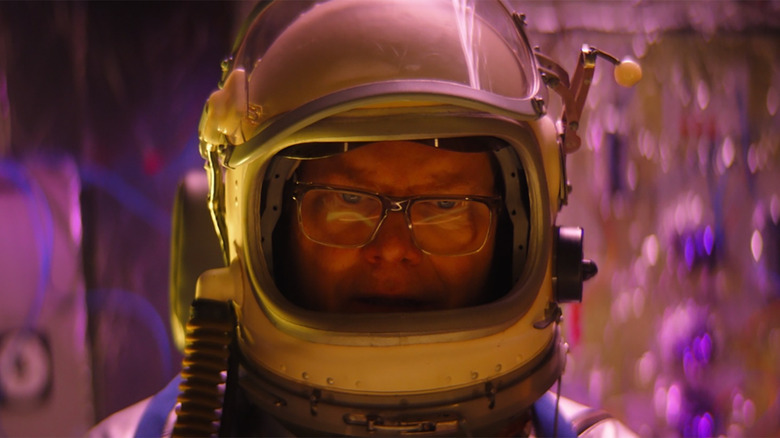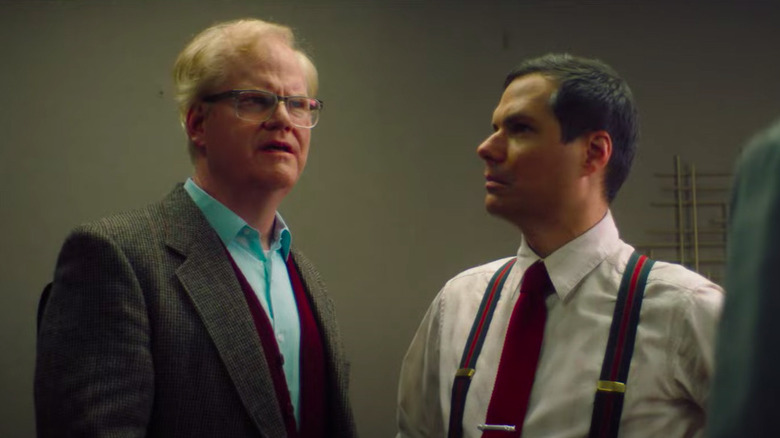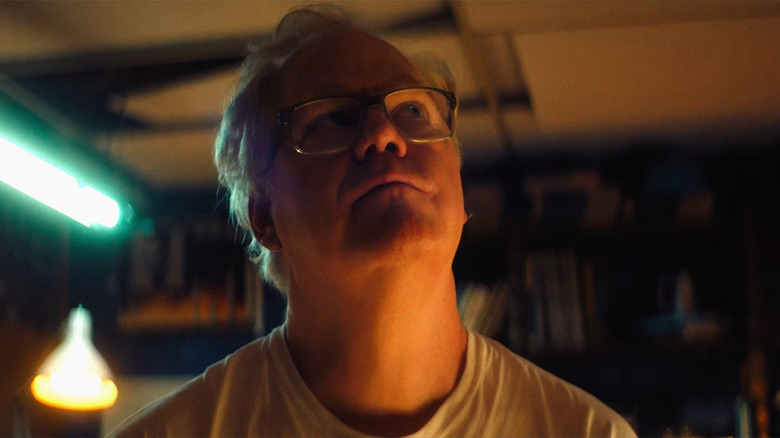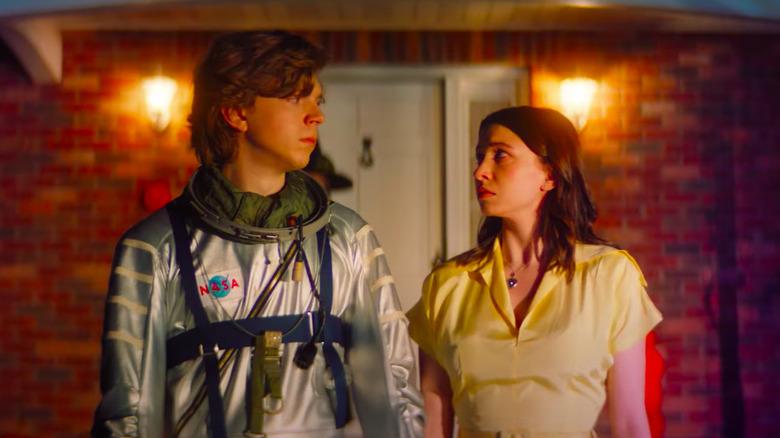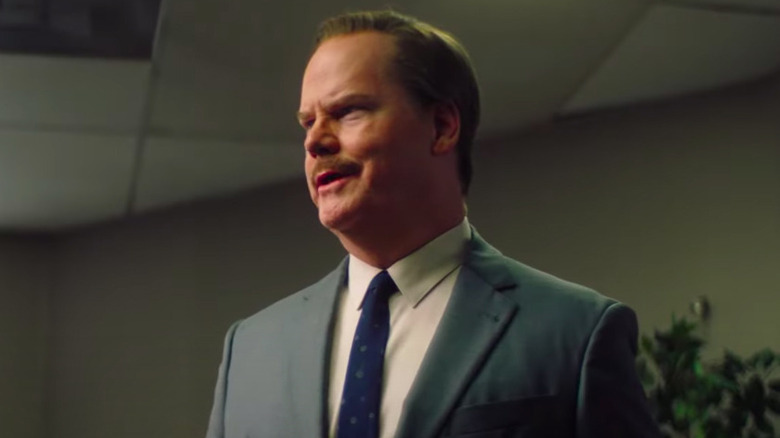Linoleum Director Colin West Talks Emulating Charlie Kaufman And Working With Jim Gaffigan [Exclusive Interview]
If you're not snorting up "Cocaine Bear" this weekend, you might want to find your way over to "Linoleum," a new drama starring Jim Gaffigan that debuted at the 2022 South By Southwest Film Festival and is currently playing in select theaters across the United States. Written and directed by Colin West, the film follows Gaffigan as Cameron, an astronomer who once dreamed of being an astronaut but settled for creating and hosting "Above and Beyond," a Bill Nye-esque educational program that airs in the not-so-primetime-slot at midnight, despite being geared towards kids.
Cameron is about to drown in a midlife crisis. His wife Erin (Rhea Seehorn of "Better Call Saul") wants a divorce, and his father's dementia is getting worse. Adding to his troubles, PBS is picking up his science program, but Cameron being replaced as the host by Kent Armstrong (a role also played by Gaffigan donning an uptight mustache), a real astronaut who looks like a younger, more handsome version of Cameron. If that wasn't enough, a satellite has just crash-landed in Cameron's backyard, forcing him to relocate to his sister-in-law's house along with Erin and their confident, outcast daughter Nora (Katelyn Nacon of "The Walking Dead") and their quiet son Sam.
What makes "Linoleum" worth watching is the beautiful tapestry that the narrative weaves as it becomes clear that not everything is as it seems. The timeless nature of the story, the seemingly odd, inexplicable moments sprinkled throughout — such as a car suddenly smashing onto the street from the sky — are all leading to something. It's not necessarily a puzzle that requires solving, but it all feeds into the driving force of the narrative, which was inspired by Colin West's own family. We talked to the filmmaker about bringing this unique story together, the films that inspired him, the challenges the narrative structure imposed, working with Jim Gaffigan, and more.
Note: This interview has been lightly edited for clarity and brevity.
'Either he was living three hours in the future, or we're all living three hours in the past'
What was the inspiration for this story? Where did it come from?
The initial inspiration was looking at my grandparents' relationship. They met when they were in high school and were together for over 60 years until they passed away in the last few years. As their lives were coming to an end, it was looking at the story of their relationship through their entire relationship. It took a long time to write the script, but that was the initial spark. I think a lot of it just comes from my own aspirations and dreams and all that stuff, I think from my own ... what would you call it? Insecurities, maybe.
Did it always have this somewhat unconventional narrative form? It's not something the viewer truly realizes until they've reached the conclusion, but there is a lingering feeling that the story has been unfolding in a rather different way than what you would expect.
The answer is no. It did not have this structure. Actually, there was a big shift that happened in 2018. I started writing the script in 2015, and in 2018, my grandfather passed away, and I was actually there in the room with him when it happened. He was developing dementia in his later years, and I was there in the hospital when it happened. In all the hullabaloo around when it happened, the nurse actually gave me his last possession, which was his watch that he had on. Later that night, I looked at the watch, and I saw that it was off. It was three hours off.
In that moment, I thought, "Wow, well, either he was living three hours in the future, or we're all living three hours in the past." It gave me this whole other point of view on the way in which the script could be presented. Initially, it was very typical in terms of flashbacks and this stuff. Then I decided to just throw it all on screen at once and see if I could even construct a narrative in a way that was delicate but not lacking emotion. So yeah, it was a tricky balance, but it came about later in the writing process for sure.
'How do you have a Game Boy in the same scene as a Corvette from '63, but they're wearing modern clothes?'
One thing I especially like, and I'm wondering how this conversation went with your production designer and your costume designer, is that the film has a feeling where it's set in the past, but you don't exactly know when. It's not clearly defined. Could be the '70s, it could be the '80s, and I really like that. Was it challenging, giving it that vibe without tipping your hand too much?
Oh, it was super challenging, but honestly, that was the most exciting part of doing the project. Actually, I think that's why people like our production designer Mollie Wartelle, and our cinematographer Ed Wu, came onto the project. Because it was this exciting world that they got to build. From the beginning, with all of these initial meetings, I was talking about how the film needed to be set in a tone, not a time. So that was really important to us, where it had to be set in 1968, 1992, and 2022, all at the same time without telling you. It was a very tricky balance. How do you have a Game Boy in the same scene as a Corvette from '63, but they're wearing modern clothes? It was a very delicate balance, but it just made things so fun. It allowed for the most interesting conversations on set, as to how we weave this tapestry together. So it was honestly quite fun.
Along those same lines, what were some of the films that inspired the storytelling and the look of the movie? Did you have any specific titles as a frame of reference?
For sure. "Donnie Darko" comes to mind immediately. That suburban world with a dark undertone was such an inspiration for me, even from when I was back in high school, just starting to make movies. I saw "Donnie Darko" back then, and I was really kind of intrigued by this world that he's in. Because I was growing up in suburban Ohio, and here's this film about suburban Virginia that has this mysterious scientific bubbling going on. Especially the first act of "Linoleum," I think, has a lot of "Darko" in it.
But another film really inspired me during the writing process. A few years into writing it, I watched Jacques Demy's film, "Lola." It was his first film, French film from the '60s, black and white. It was very fascinating the way in which the story — it's an ensemble piece about this town, and it follows these different characters and how they weave in and out. It was pretty unabashed with time period as well, in this French New Wave way of allowing the story to just evolve more organically rather than being too logical about things. I definitely took inspiration from that film and some of those films in that era, for sure. Even the pretty extreme saturation, the coloring and the aesthetic comes from some of, even Jacques Demy's later films, which was just these Technicolor dream scapes. Those are a couple of the things that inspired, but the list goes on. Charlie Kaufman, all of his films, especially those early ones, came into play. So that's some of the inspiration.
'Obviously people know him from his stand-up, but I think he has this real innocence to him'
I wanted to shift over to talk about Jim Gaffigan. How did he come onboard this movie? He's not exactly known for his dramatic work, so it seems like a surprising choice to have him be the lead of a movie like this.
Well, he may not be known for his dramatic work, but he's certainly an incredible dramatic actor. He has been doing these dramatic roles for about 10 years now. He's been building up this repertoire, and obviously people know him from his stand-up, but I think he has this real innocence to him, and [he has a] grounded melancholy that's really expressed in this film, and is very poignant in person, even. But he's a very real, honest person. There's just no falsity with him. Immediately, when his name come up, it was very quickly like, "Oh yeah, Gaffigan, he would be incredible." He actually came on pretty late in the process, but his team had read the film and pitched him to us, and he read the script and really liked it.
We had a conversation, and it's funny, because you'll talk to actors sometimes in the casting process, and they'll be asking questions about it like, "Well, who is this character?" Stuff like that. I remember, the first time I talked to Jim, he hadn't committed to the project yet, and he was already talking about these great ideas he had for it, and he was already contributing. I think Rhea Seehorn did the same thing. Both of them co-starring in this movie made for such a great dynamic, but he was a joy to work with. And of course, Rhea was too.
Speaking about the performances, when it comes to each of the main actors, since they're playing the same characters at different ages, did you talk to them about emulating each other's performances? Or is that something that you tried to keep separate so that way it didn't really feel like they were playing off one another?
It just differed per actor. Because I think Jim and Rhea, who are like the linchpins to the other characters in the different time periods, they came in and performed on a moment-to-moment basis. So yes, there's all of these metaphysics going on in the movie where you do have the same character talking to themselves in different time periods. So there's this time travel aspect to it, and any time travel story leads to paradoxes. So we immediately tried to throw those out the window and just live in the moment of the scene, rather than it being too heady and thinking about, "Well, because I'm talking to this person, I should be like this."
I think that as far as mimicry of the other actors, I do remember having many conversations with Katelyn Nacon and Gabriel Rush, who played the younger versions of [Jim and Rhea's] characters in high school. They were immediately already drawing from those two. I think they just did it by gut anyway. So it was really pretty fascinating to see how they manipulated their own persona into hinting at these things. So yeah, it was a fun process.
'We always came back to basing decisions on emotion rather than logic'
How did you determine how much you wanted to hint that there was something else going on with the narrative? There are some weird things that you could discount as Cameron's mind playing tricks on him and that kind of thing. But there are hints here that you don't even realize what's happening until a second viewing, when you know what's coming at the end. How did you find that balance so that you weren't giving it away, but at the same time, it wasn't too strange for people to be react like, "I have no idea what's going on here"?
It was definitely, again, another one of these tapestries to weave. I think a lot of it came down to the editing, because we had a lot there on the page. You look at the last 15 minutes of the movie, there's really hardly any dialogue. It's told through montage and flashbacks almost. I think a lot of this, especially in terms of setting up for the ending reveal, I suppose, came in the edit, and it was trying to delicately figure out how much we can push something without totally giving it away. I will say, though, we always came back to basing decisions on emotion rather than logic.
Some people in watching it on the first view will come up to me after a screening and say, "I figured it out in the first 30 minutes. I think I figured it out." And I think that's great. I'm really not trying to hide it. The clues are there for a reason. If you sleuth hard enough, you can start to piece it together and at least come up with concepts of what might be going on. But in terms of the edit, Keara Burton, the editor, is incredible. We were also trying to figure out the way in which we could set up this world subjectively. How can we get the audience in the point of view of our lead character, and how could we see the world through his point of view, so he can somehow start to justify all of these bizarre incidences? Of course, by the end, it's all turned on its head. But yeah, again, the whole movie, that was quite a thing to make.
Even though this is more of a dramatic performance for Jim Gaffigan, he really comes to life on the science show, "Above and Beyond." Who's responsible for the fantastic makeshift look of that show, and what was it like to develop that within the movie?
So good. Again, going back to our production designer, Mollie Wartelle and her team, she was perfect for this film, because she has this handmade aesthetic that just really works to set up tone. Of course, I was a huge "Bill Nye the Science Guy" fan, and a lot of the show comes from Bill Nye and these low budget public access shows. Actually, my friends and I, two of which are the producers on this movie, back in high school we actually had our own public access TV show. Every Sunday we actually had to fill a half an hour of stuff, and of course, we're 16 or 17, so we're making total ripoffs of "Lord the Rings" or whatever that week's film is. But it was a blast. Knowing that world in and out was so fun.
Actually, we shot all that TV show stuff on the first day. So it was really fun for the cast and crew too, to be able to laugh along with it. Because Gaffigan, between takes, he's there doing stand-up for us and trying new bits and stuff. So the crew loved him, and especially with this fun world that he got to play with all these pieces, that was a real joy to start off the shoot with.
'I'm also very, very keen on making more intimate, more or less Charlie Kaufman-esque, more introspective films'
What kind of stories do you see yourself telling in the future? Is there a certain filmmaker who maybe encapsulates the kind of career you'd like to have? Not necessarily as far as huge success, but more from a storytelling perspective. Do you find yourself maybe wanting to do blockbusters in the future, or do you think maybe you'll stick to more Charlie Kaufman-esque stuff? How do you see your career filling out?
I like that question. It's very specific. I think sometimes people are like, "What's next?" But you bring up a good point. What's the path? This is going to sound heavy, but I'm a Gemini, so I feel like I'm a two-headed beast, and I think that's why a lot of my films have doubling and coupling. Jim Gaffigan plays two characters in this, he plays these two opposing roles, and those ideas come into play when I talk about maybe what's next.
I have been conjuring the next projects, and I have these two categories for them. I call them my A-side projects and my B-side projects, and I'm very interested in doing bigger commercial stuff. I think that sounds really fun to be able to play with all the toys and do these big scale movies that get a wide audience. Of course, why wouldn't you want a wide audience? But I'm also very, very keen on making more intimate, more or less Charlie Kaufman-esque, more introspective films. I have this script that I just finished that I'm very, very excited about, that has a similar structure as "Linoleum" in that it's just crazy. It's just very meta. It's "Linoleum" to the max. So I'm very excited. I want to get that off the ground soon, too.
So I have these two avenues going, and I'm excited to do that. I think I wouldn't be fulfilled if both of those paths weren't happening concurrently. You look at these directors who can play in that big budget world, get their own projects going, and then go back and forth. You look at [Christopher] Nolan or someone like that. I think that's an interesting way of creating to keep yourself on your toes.
"Linoleum" is playing in select theaters now. Residents of Los Angeles, Ohio, and New York can attend these screenings with live Q&As:
- Laemmle Noho 7 in North Hollywood, CA: Friday, Feb. 24 at 7:10PM. Q&A with director Colin West and Rhea Seehorn.
- Gateway Film Center in Columbus, OH: Saturday, Feb. 25 at 7PM. Q&A with director Colin West.
- Quad Cinema in New York, NY: Sunday, Feb. 26 at 1:30PM, 4:15PM, and 7:30PM, each with Q&A with director Colin West and Jim Gaffigan.
